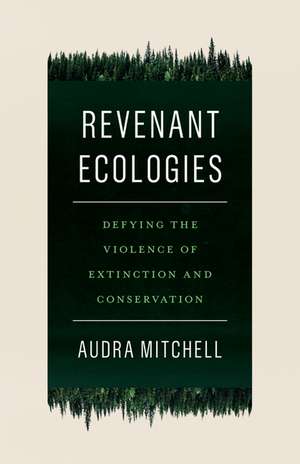Revenant Ecologies: Defying the Violence of Extinction and Conservation
Autor Audra Mitchellen Limba Engleză Paperback – 16 ian 2024
As global rates of plant and animal extinctions mount, anxieties about the future of the earth’s ecosystems are fueling ever more ambitious efforts at conservation, which draw on Western scientific principles to manage species and biodiversity. In Revenant Ecologies, Audra Mitchell argues that these responses not only ignore but also magnify powerful forms of structural violence like colonialism, racism, genocide, extractivism, ableism, and heteronormativity, ultimately contributing to the destruction of unique life forms and ecosystems.
Critiquing the Western discourse of global extinction and biodiversity through the lens of diverse Indigenous philosophies and other marginalized knowledge systems, Revenant Ecologies promotes new ways of articulating the ethical enormity of global extinction. Mitchell offers an ambitious framework—(bio)plurality—that focuses on nurturing unique, irreplaceable worlds, relations, and ecosystems, aiming to transform global ecological–political relations, including through processes of land return and critically confronting discourses on “human extinction.”
Highlighting the deep violence that underpins ideas of “extinction,” “conservation,” and “biodiversity,” Revenant Ecologies fuses political ecology, global ethics, and violence studies to offer concrete, practical alternatives. It also foregrounds the ways that multi-life-form worlds are actively defying the forms of violence that drive extinction—and that shape global efforts to manage it.
Retail e-book files for this title are screen-reader friendly with images accompanied by short alt text and/or extended descriptions.
Preț: 216.17 lei
Nou
Puncte Express: 324
Preț estimativ în valută:
41.36€ • 45.11$ • 34.88£
41.36€ • 45.11$ • 34.88£
Carte disponibilă
Livrare economică 03-17 aprilie
Livrare express 19-25 martie pentru 32.92 lei
Preluare comenzi: 021 569.72.76
Specificații
ISBN-13: 9781517906818
ISBN-10: 1517906814
Pagini: 392
Ilustrații: 5 black and white illustrations
Dimensiuni: 140 x 216 x 28 mm
Greutate: 0.52 kg
Editura: University of Minnesota Press
Colecția Univ Of Minnesota Press
ISBN-10: 1517906814
Pagini: 392
Ilustrații: 5 black and white illustrations
Dimensiuni: 140 x 216 x 28 mm
Greutate: 0.52 kg
Editura: University of Minnesota Press
Colecția Univ Of Minnesota Press
Notă biografică
Audra Mitchell is professor and Canada Research Chair in Global Political Ecology at the Balsillie School of International Affairs at Wilfrid Laurier University. Mitchell is author of International Intervention in a Secular Age: Re-enchanting Humanity? and Lost in Transformation: Violent Peace and Peaceful Conflict in Northern Ireland and is coeditor of Hybrid Forms of Peace: From the Everyday to Post-liberalism.
Recenzii
"Revenant Ecologies tackles the huge, widely resonating topic of extinction and blows it wide open with rigorous structural analysis from a broad base of humanities and social science traditions, engaging with Indigenous, feminist, and decolonial scholarship. Audra Mitchell challenges us to rethink how we use the concept of extinction and what ethical and justice issues we may have been missing all along."—Kyle Whyte, University of Michigan
"Mitchell’s novel contribution with this book [...] is a close reading of the way Western projects of conservation reproduce many of the same kinds of violence as colonization."—Ancillary Review of Books
"For any geographer whose work is connected to conservation, extinction, and environmental justice, or for the reader who wants to reframe their climate anxiety, this transformative book is a must read."—Canadian Geographies
"Highly recommended."—CHOICE
"Mitchell’s book is crucial for anyone working in extinction studies or Anthropocene studies, and it contains many valuable insights for those working in environmental humanism more broadly."—H-Net Reviews
"Revenant Ecologies by Audra Mitchell is an excellent book. It is a rare example of a book that can serve as both an introductory text to understanding the features and critiques of Western hegemonic forms of conservation, and a highly original and thought-provoking challenge to academics who are already very familiar with these debates."—Environment and Security
"Mitchell’s novel contribution with this book [...] is a close reading of the way Western projects of conservation reproduce many of the same kinds of violence as colonization."—Ancillary Review of Books
"For any geographer whose work is connected to conservation, extinction, and environmental justice, or for the reader who wants to reframe their climate anxiety, this transformative book is a must read."—Canadian Geographies
"Highly recommended."—CHOICE
"Mitchell’s book is crucial for anyone working in extinction studies or Anthropocene studies, and it contains many valuable insights for those working in environmental humanism more broadly."—H-Net Reviews
"Revenant Ecologies by Audra Mitchell is an excellent book. It is a rare example of a book that can serve as both an introductory text to understanding the features and critiques of Western hegemonic forms of conservation, and a highly original and thought-provoking challenge to academics who are already very familiar with these debates."—Environment and Security
